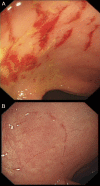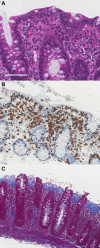Microscopic colitis: diagnosis and management
- PMID: 31656564
- PMCID: PMC6788131
- DOI: 10.1136/flgastro-2018-101040
Microscopic colitis: diagnosis and management
Abstract
Microscopic colitis (MC) is a common cause of chronic, non-bloody, watery diarrhoea in older patients. The diagnosis depends on characteristic histological findings. Bile acid malabsorption and autoimmune conditions, including coeliac disease, are more frequently found in patients with MC, but colorectal neoplasia and mortality are not increased. Non-steroidal anti-inflammatory drugs, proton-pump inhibitors, selective serotonin reuptake inhibitors and smoking tobacco confer an increased risk of developing MC. Although a so-called benign disease, which rarely causes serious complications, it does have an impact on the quality of life. Several treatment options exist, but budesonide is the only treatment proven in randomised-controlled trials to be effective and safe for induction and maintenance of remission. This article provides a practical overview for the gastroenterologist looking after patients with MC.
Keywords: chronic diarrhoea; collagenous colitis; lymphocytic colitis; microscopic colitis.
© Author(s) (or their employer(s)) 2019. No commercial re-use. See rights and permissions. Published by BMJ.
Conflict of interest statement
Competing interests: CP: speaker fees from AbbVie, Avantis, Dr Falk Pharma, Ferring, Hospira, Janssen, Merck, Shire and Takeda; payment for advisory board attendance from Avantis, Dr Falk Pharma, Ferring, Janssen, Hospira (Pfizer), Merck, Napp and Takeda; and support for attendance to other meetings from Avantis, Dr Falk Pharma, Merck, Shire, Hospira, Takeda and Vifor.
Figures


References
Publication types
LinkOut - more resources
Full Text Sources
